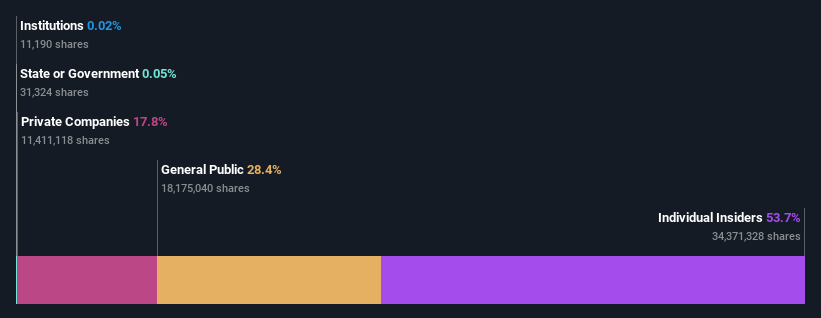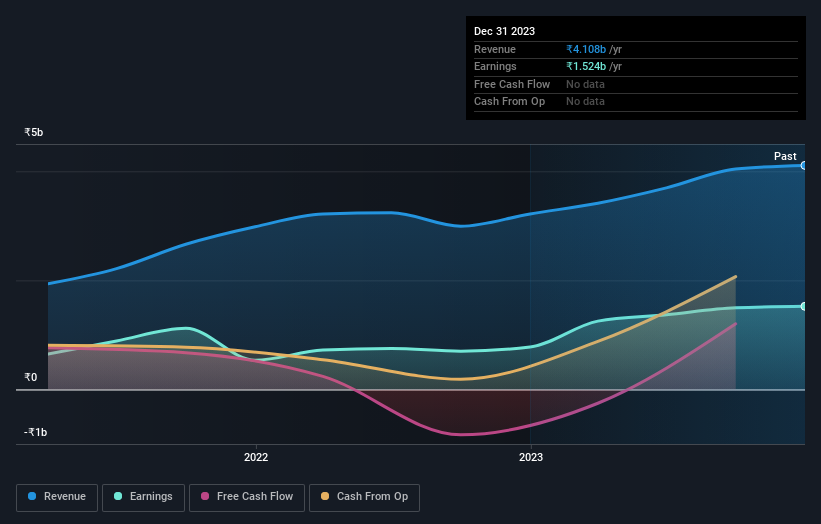- India
- /
- Energy Services
- /
- NSEI:DEEPINDS
Deep Industries Limited's (NSE:DEEPINDS) most bullish insider is Co-Chief Executive Officer Rupesh Savla, and their holdings value went up by 11% last week
Key Insights
- Significant insider control over Deep Industries implies vested interests in company growth
- 51% of the business is held by the top 3 shareholders
- Ownership research, combined with past performance data can help provide a good understanding of opportunities in a stock
Every investor in Deep Industries Limited (NSE:DEEPINDS) should be aware of the most powerful shareholder groups. With 54% stake, individual insiders possess the maximum shares in the company. That is, the group stands to benefit the most if the stock rises (or lose the most if there is a downturn).
As a result, insiders scored the highest last week as the company hit ₹19b market cap following a 11% gain in the stock.
Let's delve deeper into each type of owner of Deep Industries, beginning with the chart below.
See our latest analysis for Deep Industries

What Does The Lack Of Institutional Ownership Tell Us About Deep Industries?
Small companies that are not very actively traded often lack institutional investors, but it's less common to see large companies without them.
There are many reasons why a company might not have any institutions on the share registry. It may be hard for institutions to buy large amounts of shares, if liquidity (the amount of shares traded each day) is low. If the company has not needed to raise capital, institutions might lack the opportunity to build a position. Alternatively, there might be something about the company that has kept institutional investors away. Deep Industries' earnings and revenue track record (below) may not be compelling to institutional investors -- or they simply might not have looked at the business closely.

Hedge funds don't have many shares in Deep Industries. Because actions speak louder than words, we consider it a good sign when insiders own a significant stake in a company. In Deep Industries' case, its Co-Chief Executive Officer, Rupesh Savla, is the largest shareholder, holding 31% of shares outstanding. With 13% and 6.4% of the shares outstanding respectively, Shantilal Savla Family Trust and Parasbhai Savla are the second and third largest shareholders. Interestingly, the third-largest shareholder, Parasbhai Savla is also a Chairman of the Board, again, indicating strong insider ownership amongst the company's top shareholders.
To make our study more interesting, we found that the top 3 shareholders have a majority ownership in the company, meaning that they are powerful enough to influence the decisions of the company.
While studying institutional ownership for a company can add value to your research, it is also a good practice to research analyst recommendations to get a deeper understand of a stock's expected performance. We're not picking up on any analyst coverage of the stock at the moment, so the company is unlikely to be widely held.
Insider Ownership Of Deep Industries
While the precise definition of an insider can be subjective, almost everyone considers board members to be insiders. Company management run the business, but the CEO will answer to the board, even if he or she is a member of it.
Most consider insider ownership a positive because it can indicate the board is well aligned with other shareholders. However, on some occasions too much power is concentrated within this group.
Our most recent data indicates that insiders own the majority of Deep Industries Limited. This means they can collectively make decisions for the company. Given it has a market cap of ₹19b, that means they have ₹10.0b worth of shares. Most would be pleased to see the board is investing alongside them. You may wish todiscover (for free) if they have been buying or selling.
General Public Ownership
With a 28% ownership, the general public, mostly comprising of individual investors, have some degree of sway over Deep Industries. While this group can't necessarily call the shots, it can certainly have a real influence on how the company is run.
Private Company Ownership
We can see that Private Companies own 18%, of the shares on issue. Private companies may be related parties. Sometimes insiders have an interest in a public company through a holding in a private company, rather than in their own capacity as an individual. While it's hard to draw any broad stroke conclusions, it is worth noting as an area for further research.
Next Steps:
While it is well worth considering the different groups that own a company, there are other factors that are even more important. Consider risks, for instance. Every company has them, and we've spotted 2 warning signs for Deep Industries you should know about.
Of course, you might find a fantastic investment by looking elsewhere. So take a peek at this free list of interesting companies.
NB: Figures in this article are calculated using data from the last twelve months, which refer to the 12-month period ending on the last date of the month the financial statement is dated. This may not be consistent with full year annual report figures.
New: Manage All Your Stock Portfolios in One Place
We've created the ultimate portfolio companion for stock investors, and it's free.
• Connect an unlimited number of Portfolios and see your total in one currency
• Be alerted to new Warning Signs or Risks via email or mobile
• Track the Fair Value of your stocks
Have feedback on this article? Concerned about the content? Get in touch with us directly. Alternatively, email editorial-team (at) simplywallst.com.
This article by Simply Wall St is general in nature. We provide commentary based on historical data and analyst forecasts only using an unbiased methodology and our articles are not intended to be financial advice. It does not constitute a recommendation to buy or sell any stock, and does not take account of your objectives, or your financial situation. We aim to bring you long-term focused analysis driven by fundamental data. Note that our analysis may not factor in the latest price-sensitive company announcements or qualitative material. Simply Wall St has no position in any stocks mentioned.
About NSEI:DEEPINDS
Deep Industries
Provides oil and gas field and related support services in India.
High growth potential with excellent balance sheet.
Market Insights
Community Narratives



